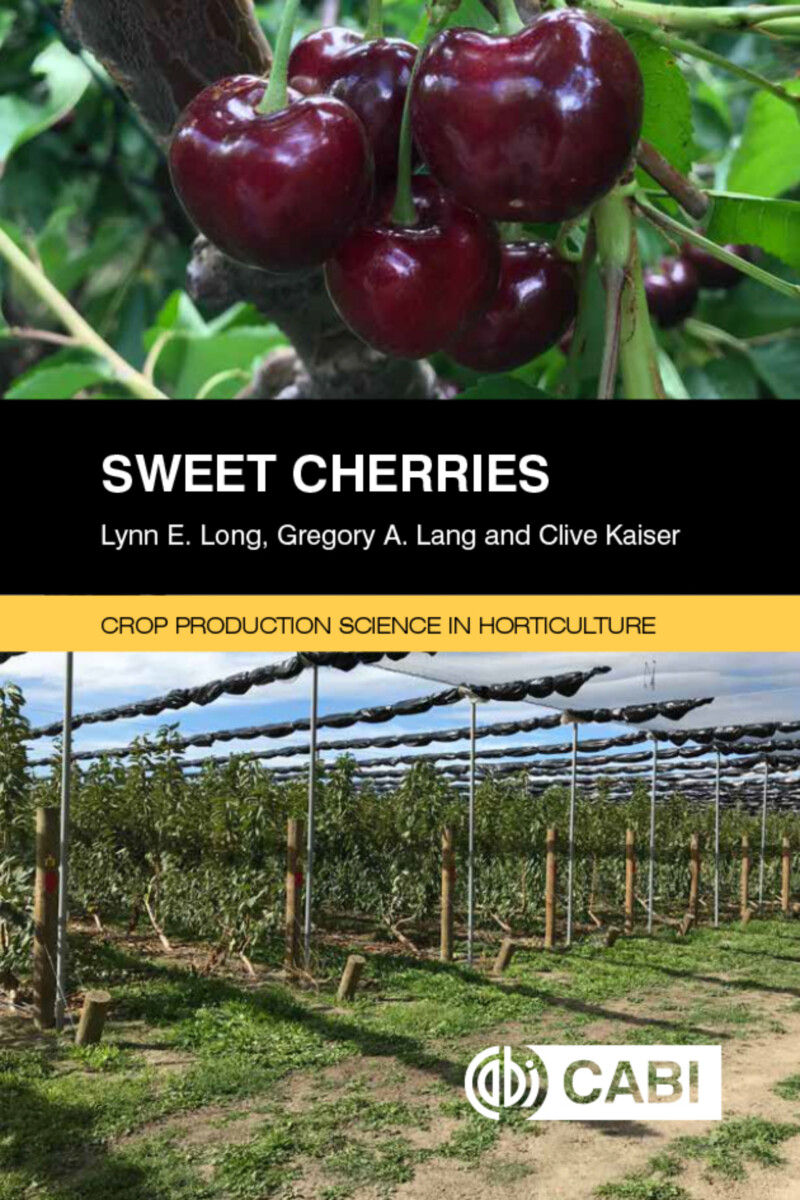Sweet Cherries
- Publisher
CABI - Published
23rd December 2020 - ISBN 9781786398284
- Language English
- Pages 360 pp.
- Size 6" x 9"
- Images color illus
This new book provides comprehensive coverage of the history, genetic improvements, production physiology of growth and cropping, orchard establishment and management, and harvest considerations for sustainable cherry production. Sweet cherries are a specialty crop, subject to significant production risks for growers, yet with high potential market returns due to strong consumer demand for the fruit's intensely enjoyable flavor and nutraceutical benefits.
Written by a renowned team of experts, this book emphasizes the scientific principles underlying cherry production practices. It acts as a resource for a scientific foundational understanding of plant growth and cropping, providing the key to both reasoned choice of orchard practices and the solution of future problems. The book:
- Covers improved sweet cherry fruiting varieties and rootstocks
- Describes state-of-the-art tree training and production systems
- Considers production risk management technologies and decisions.
“Sweet Cherries” is written with practical details and underlying physiological concepts for use by beginning and established fruit growers, consultants, and advisors, with a primary focus on fresh market sweet cherries, in addition to students and professionals in horticulture."
Gary Pullano - Editor, Fruit Growers News
1: Introduction
2: Cherry Flowering, Fruiting, and Cultivars
3: Sweet Cherry Rootstocks
4: Planning a New Cherry Orchard
5: Orchard Establishment and Production
6: Sweet Cherry Pruning Fundamentals
7: Sweet Cherry Training Systems
8: Managing the Orchard Environment
9: Fruit Ripening and Harvest
10: Managing Orchard Pests
11: Managing Orchard Pathogens and Disorders
12: The Future of Cherry Production
Lynn Long
Lynn Long is a Professor and an Extension Horticulturist, hired by Oregon State University in 1988 to deliver Extension programming to the cherry growers of north central Oregon, the largest cherry production region of the state. In that capacity, he delivered research based information and technology to the cherry growers of Oregon and the Pacific Northwest. In 1999, he was promoted to the rank of full professor and developed an international reputation as one of the leading educators of cherry related knowledge around the world. He has given invited talks to scientists and cherry growers in 18 countries including Chile, Germany, Greece, South Africa, Australia and Russia.
For much of his career, Lynn has focused his research and extension effort on evaluating new cherry varieties, rootstocks and training systems. While with Oregon State University, he established a variety trial in 1996 and has evaluated well over 100 varieties and selections for their potential adoption by Pacific Northwest cherry growers. He has authored or co-authored numerous publications on these topics including an award-winning training system manual, and Extension publications on cherry rootstocks, and pruning trees on dwarfing and precocious rootstocks. However, as an Extension educator, Lynn has also conducted research and/or written publications on such wide-ranging topics as cherry fruit fly, bacterial canker, orchard establishment and soil improvement.
Gregory Lang
Gregory Lang has been a professor of tree fruit physiology at Michigan State University (MSU) and program leader for the stone fruit physiology laboratory since 2000. He was previously an associate professor and program leader for the sweet cherry physiology laboratory at Washington State University from 1994-2000 and an assistant/associate professor of pomology at Louisiana State University from1987-1994. He earned a B.S. degree in horticultural science from University of Georgia, and an M.S. in pomology and Ph.D. in plant physiology from University of California-Davis. His areas of expertise include tree fruit horticulture (development and management of sustainable orchard systems – pruning, training,growth regulation, and protective orchard covering systems, with particular emphasis on sweet cherry), tree fruit physiology (environmental stress, developmental and reproductive physiology, carbohydrate and nitrogen partitioning and utilization), and Prunus germplasm improvement and evaluation. Dr. Lang has authored more than 185 research and industry articles related to fruit production, released or co-released five new sweet cherry varieties, and has edited or co-edited several books and proceedings on cherry research. Under the auspices of the International Society for Horticultural Science, he has served as the chair of international working groups on cherry production and orchard systems, and has provided numerous keynote addresses at scientific and grower conferences around the world. He is the recipient of the American Society for Horticultural Science’s Undergraduate Research Award (1981), Graduate Educator Award (2010), and Extension Materials Award (2017), as well as the International Fruit Tree Association’s Distinguished Research Award (2001).
Clive Kaiser
Dr. Clive Kaiser is a pomologist, having worked on multiple different cropping systems on 4 continents. He has worked in academia, government and private industry in both exports and imports and has seen the world fruit industries from bud to shelf. He has been working on sweet cherries since 2000 and his work has resulted in several US and International Patents for plant coatings that prevent fruit cracking, reduce water usage in production systems and prevent insects from laying eggs in sweet cherry fruit. He is a Professor in the Department of Horticultural Science at Oregon State University and serves as the Interim Director of the Hermiston Agricultural Research and Extension Center.


